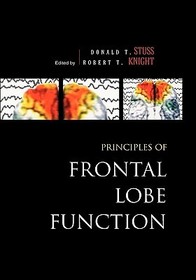
Principles of Frontal Lobe Function
-
10% KEDVEZMÉNY?
- A kedvezmény csak az 'Értesítés a kedvenc témákról' hírlevelünk címzettjeinek rendeléseire érvényes.
- Kiadói listaár GBP 155.00
-
74 051 Ft (70 525 Ft + 5% áfa)
Az ár azért becsült, mert a rendelés pillanatában nem lehet pontosan tudni, hogy a beérkezéskor milyen lesz a forint árfolyama az adott termék eredeti devizájához képest. Ha a forint romlana, kissé többet, ha javulna, kissé kevesebbet kell majd fizetnie.
- Kedvezmény(ek) 10% (cc. 7 405 Ft off)
- Kedvezményes ár 66 646 Ft (63 473 Ft + 5% áfa)
Iratkozzon fel most és részesüljön kedvezőbb árainkból!
Feliratkozom
74 051 Ft

Beszerezhetőség
Megrendelésre a kiadó utánnyomja a könyvet. Rendelhető, de a szokásosnál kicsit lassabban érkezik meg.
Why don't you give exact delivery time?
A beszerzés időigényét az eddigi tapasztalatokra alapozva adjuk meg. Azért becsült, mert a terméket külföldről hozzuk be, így a kiadó kiszolgálásának pillanatnyi gyorsaságától is függ. A megadottnál gyorsabb és lassabb szállítás is elképzelhető, de mindent megteszünk, hogy Ön a lehető leghamarabb jusson hozzá a termékhez.
A termék adatai:
- Kiadó OUP USA
- Megjelenés dátuma 2002. augusztus 8.
- ISBN 9780195134971
- Kötéstípus Keménykötés
- Terjedelem640 oldal
- Méret 261x184x35 mm
- Súly 1497 g
- Nyelv angol
- Illusztrációk numerous figures, tables and halftones 0
Kategóriák
Rövid leírás:
This volume provides a comprehensive review of historical and current research on the functions of the frontal lobes and frontal systems of the brain. The content spans frontal lobe functions from birth to old age, from biochemistry and anatomy to rehabilitation, and from normal to disrupted function. The book is intended to be a standard reference work on the frontal lobes for researchers, clinicians and students in the fields of neurology, neuroscience, psychiatry, psychology, and health care.
TöbbHosszú leírás:
Principles of Frontal Lobe Function provides a comprehensive review of historical and current research on the functions of the frontal lobes and frontal systems of the brain. The content covers frontal lobe functions from birth to old age, from biochemistry and anatomy to rehabilitation, from normal to disrupted function. Two introductory chapters guide, in different ways, reading of subsequent chapters. Following are a number of chapters dealing with basic science - neuroanatomy and neurochemistry. The various theoretical positions proposed reflect the diversity of approaches to the same fundamental question about the role of frontal lobes. Some chapters deal with broad, salient issues such as functional heterogeneity versus homogeneity, while others narrow their focus on specific functions like motor control, language, memory and attention, executive functioning, and emotional and social behaviour. The book concludes with chapters on applied clinical research such as frontal lobe pathology in neurological diseases and disorders, stroke and traumatic brain injury, as well as strategies for neurorehabilitation.
The book is intended to be a standard reference work on the frontal lobes for researchers, clinicians, and students in the fields of neurology, neuroscience, psychiatry, psychology, and health care.
If you still wonder what the prefrontal cortex does, and how to perform a meaningful exam of its functions, you should read this book. You will find here the right answers to many questions regarding the function of the prefrontal cortex . . . This book is certainly very good not only as a reference book, but also as a textbook for neuroscientists who are already engaged in the study of the prefrontal cortex, as well as for beginners who want to learn more about this fascinating cortical region.
Tartalomjegyzék:
Foreword
Preface
Introduction
The Human Frontal Lobes: Transcending the Default Mode through Contigent Encoding
Association Pathways of the Prefrontal Cortex and Functional Observations
Neurochemical Modulation of Prefrontal Cortical Functions in Humans and Animals
Functional Architecture of the Dorsolateral Prefrontal Cortex in Monkeys and Man
Physiology of Executive Functions: The Perception-Action Cycle
The Theatre of the Mind: Physiological Studies of the Human Frontal Lobes
Motor Programming for Hand and Vocalizing Movements
Cortical Control of Visuometer Reflexes
Disorders of Language After Frontal Lobe Injury
The Organization of Working Memory Function in Lateral Prefrontal Cortex
The Frontal Cortex and Working with Memory
Memory Retrieval and Executive Control Processes
Dorsal Prefrontal Cortex: Maintenance in Memory or Attentional Selection
Mechanisms of Conflict Resolution in Prefrontal Cortex
Fractionating the Central Executive
Fractionation of the Supervisory System
Cognitive Focus through Adaptive Neural Coding in Primate Prefrontal Cortex
The Structured Event Complex and the Human Prefrontal Cortex
Chronesthesia: Conscious Awareness of Subjective Time
Integration Across Multiple Cognitive and Motivational Domains in Monkey Prefrontal Cortex
Emotion, Decision-Making and the Ventromedial Prefrontal Cortex
The Functions of the Orbitofrontal Cortex
Mapping Mood: An Evolving Emphasis on Frontal-Limbic Interactions
Fractionation and Localization of Distinct Frontal Lobe Processes: Evidence from Focal Lesions in Humans
Neurobehavioural Consequences of Neurosurgical Treatments and Focal Lesions of Frontal-Subcortical Circuits
The Role of Prefrontal Cortex in Normal and Disordered Cognitive Control: A Cognitive Neuroscience Perspective
Novel Approaches to The Assessment of Frontal Damage and Executive Deficits in Traumatic Brain Injury
Normal Development of Prefrontal Cortex, from Birth to Young Adulthood: Cognitive Functions, Anatomy and Biochemistry
Executive Functions Following Frontal Lobe Injury: A Developmental Perspective
Aging, Memory, and Frontal Lobe Functioning
Frontal Lobe Plasticity and Behaviour
Principles of the Rehabilitation of Frontal Lobe Function
Prefrontal Cortex: The Present and the Future





